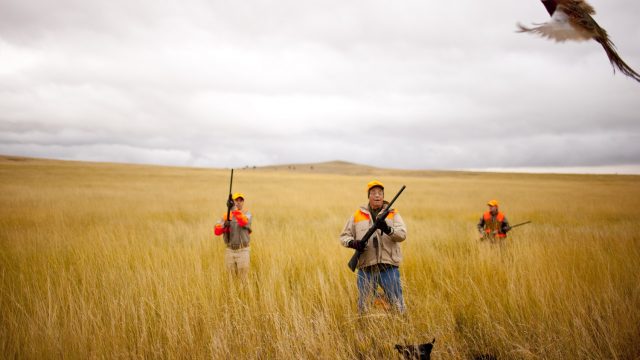Group's Use Of State Auction To Promote Conservation Measure Was "Unfortunate" Say Officials

North Dakota is having a robust debate about conservation. A group of conservation groups want to amend the state constitution to create a massive conservation fund that would be funded by hundreds of millions in oil tax revenues per biennium, with a mandate that most of it be spent whether conservation spending is needed or not.
That these groups pushing the measure – organizations like Ducks Unlimited and the North Dakota Wildlife Federation – would also be eligible for grants out of the fund might speak to some of the motivations for the amendment, and is a fact voters should keep in mind.
Anyway, the groups – under the umbrella of the extremely well-funded North Dakotans for Clean Water Wildlife and Parks – are currently collecting petition signatures to put the amendment on the November ballot. It’s hard to say how well the signature collecting is going (the group has already broken a promise to not use paid petitioners after they were burned by signature fraud last election cycle), but one of their signature collection tactics has drawn the ire of state officials.
It may surprise you, but poachers are fined and/or having their equipment seized the revenues don’t go to the State of North Dakota. Rather, they go to the North Dakota Wildlife Federation. This group takes control of the seized property and auctions it off, with the revenues going to the Report All Poachers Program.
But at a recent auction the group also invited petitioners for the conservation amendment. I wrote a story about the incident at Watchdog.org, and when I spoke to state officials about it they said the decision to invite petitioners to the auction was “unfortunate” and “concerning.”
“By state law, it’s not a department program,” Chief Game Warden Bob Timian said of the auction, though he also said North Dakota Fish and Wildlife is represented on the board overseeing the RAP program.
He also acknowledged little oversight for how the RAP money is used.
“The only requirement for reporting is that they’re required to give us an accounting of the auction,” Timian said in a telephone interview.
He described the use of the auction to circulate petitions for the conservation amendment as “unfortunate.”
“We didn’t even know the petitions were going to be there,” Timian said. “If I’d known about it we would have had a discussion about it. The RAP program is supposed to be apolitical. …
“It seems like way back when, when they created this program, they wanted a third-party organization handling this event so it didn’t look like a law enforcement agency was profiting from the seizure of private property,” state Rep. Todd Porter, a Republican from Mandan, told Watchdog.org. “So this is really old. I wasn’t even aware that this is how it was handled. I started doing a little more digging and found out that the state, when they created this Report All Poachers Program, they wanted a neutral third-party organization.”
Porter sponsored legislation last year that created the state’s existing conservation fund. He said it’s “concerning” that the group picked to administer the program has “become more political.”
“I don’t necessarily agree that they should have been collecting signatures at this event,” he said. “I don’t think their political agenda should have been on display at what appeared to be a state-sanctioned event. They crossed the line on that.”
Rep. Porter goes on to say that he believes it’s important that a neutral third party handle the auction of seized property to avoid the appearance that a state agency is profiting from taking private property. That’s a valid concern, but also concerning is that a group that is benefitting from the seized property as a political agenda.
The state partnering with a private entity for this sort of thing is all well and good, but if that group is engaged in politics that becomes a problem. Even more problematic is that the state apparently has been lax in its oversight of how the funds in the RAP program are being spent. Terry Steinwand, Director of North Dakota’s Game & Fish Department, isn’t even sure how the funds are being spent:
“Being a private organization, we don’t have access to that,” Steinwand replied Monday in an email. “But it’s also one of the questions I’ve asked, i.e., how are the RAP funds spent?”
“(I)t would be illegal for any of these funds to be used for the initiated measure,” Steinwand wrote to Wheeler in a May 14 email. “The law is clear that it can only be used for RAP associated activities and expenses associated with the auction.”
Rep. Porter told me that he’s working on an audit of the program to ensure that the funds are being used appropriately. But even if they are, should a group with a political agenda be getting any revenues from the state?




